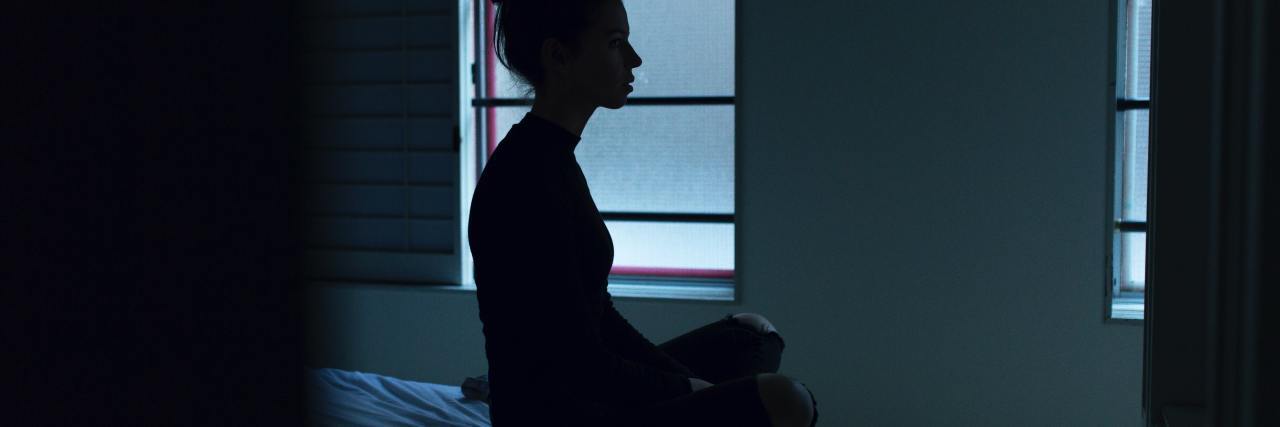This Psych Nurse’s Belief Shows Why We Need to Destroy Eating Disorder Stigma
Editor's Note
If you live with an eating disorder, the following post could be potentially triggering. You can contact the Crisis Text Line by texting “NEDA” to 741741.
As eating disorders are talked about more and more, people assume that the stigma around the illness no longer exists. It would be amazing if it didn’t, but it’s something that people who struggle with eating disorders have to suffer through every single day.
First, I want to talk about the experience that inspired me to write this article. I’m writing this from a lumpy mattress, with sheets you can barely call blankets and walls with plaster covering where holes once were — a psych ward. While I am here for issues unrelated to my eating disorder, it doesn’t mean that I am not still very much struggling with it. Without mentioning unneeded triggering details, it’s something that I thought my nurse was aware of due to behaviors that have been happening. I was very, very wrong. He spent the whole day trying to get me to eat and I finally had gotten myself to choke down the Boost meal replacement that those who have this illness know and love (ha). I asked for my as-needed medication because I was very anxious about it, which understandingly prompted my nurse to ask why. I listed my eating disorder among the reasons why I was anxious about having it. His response was that I can’t have an eating disorder and it’s a past diagnosis because I had the Boost. He was surprised when I told him that it is still a very much current diagnosis and that I’m actually going to treatment for it soon.
This is not an uncommon belief. Many people think that if they see an eating-disordered person eat, then they’re not sick. Somehow, we’re expected to eat nothing at all or else we’re just faking it. And this is a fear that I know I personally face every day, along with my friends whom I have met in treatment. I have a constant fear that people think I’m not sick, that they think I’m faking it — and here I am today, with that fear reinforced. And it’s not just that nurse who reinforces those thoughts. It’s the media, it’s people around me — it’s even treatment centers. And it’s not OK. For one, not every eating disorder is purely restrictive. There’s bulimia nervosa, where the main symptom is binging and purging. There’s ARFID (avoidant/restrictive food intake disorder) which involves restriction, but not for reasons related to body image and weight loss. There’s also OSFED (other specified feeding and eating disorders), which may include restriction, but not always. Binge eating disorder is also a serious eating disorder, and does not include restriction. Basically, what I’m trying to say is: not all people with eating disorders restrict, and all people with eating disorders do eat.
The next belief is that all people with eating disorders are thin. This is how eating disorders are portrayed in the media — for example, in movies, actors always have to lose weight for their role. The thing is, the majority of people with eating disorders are a healthy weight and may not fit society’s typical image of thinness. In fact, less than 6% of those with eating disorders are medically diagnosed as underweight. This belief is extremely harmful to people who struggle with this illness because it contributes to the thought that we’re not sick enough, that our illness isn’t real. This is a belief that sadly also shows up in treatment centers for the very disorder I’m speaking of.
Another belief that needs to be addressed is that eating disorders are a “white girl’s illness.” This is simply not true. Black teenagers are 50% more likely to have bulimic behaviors than white teenagers, yet they are half as likely to be diagnosed and/or treated. Hispanic people are also more likely to be bulimic and run into the same issue with being treated as black people do. Learning this information surprised me because with all the treatment I’ve completed for my eating disorder, I have only been in treatment with a few BIPOC (Black, Indigenous and people of color). Now, knowing this information, it makes me incredibly angry because the reason is not that it is less common for BIPOC to have eating disorders, but because it’s more difficult for them to receive treatment. And yet again with the media incorrectly portraying this illness, it is rare to see a BIPOC with an eating disorder represented in the media.
There are countless other harmful beliefs and stigmas related to this eating disorder, but this article would be far too long. People seem to think that because eating disorders are talked about more, that there’s no more work to be done. But that’s not the case. We need to destroy these beliefs and stigmas and stop hurting people with eating disorders with them. We need to educate ourselves. We need to educate our loved ones. Or, like I did today, sometimes you even need to educate a health professional.
If you struggle with an eating disorder and these beliefs, I hear you. I see you. You deserve help regardless of your weight, your race, or how much you do or don’t eat. You deserve recovery.
Photo by Ben Blennerhassett on Unsplash

